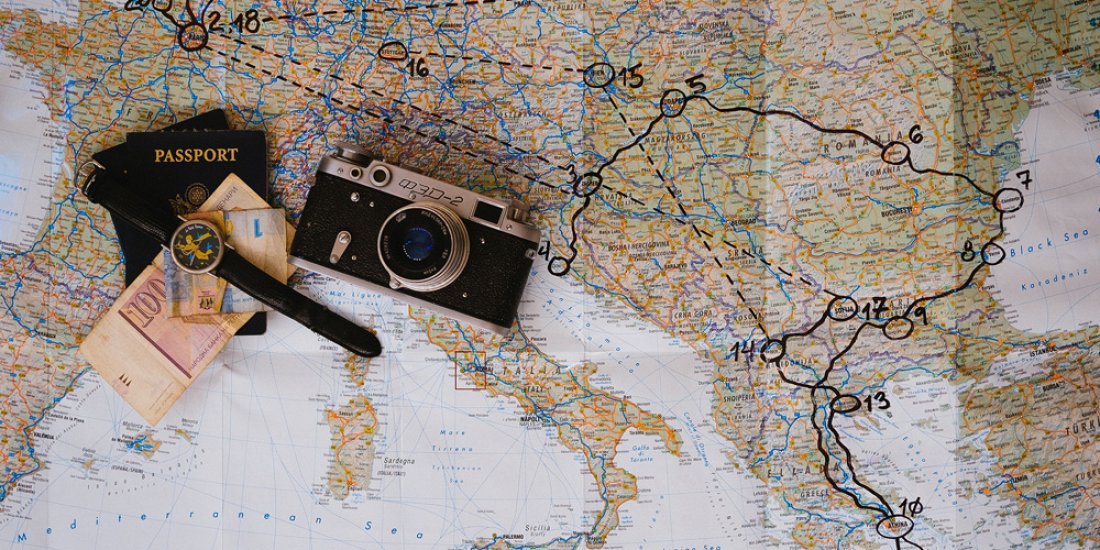The Best Way To Access Your Money On Holiday Overseas
 Photo By: Chelsea London Phillips
Photo By: Chelsea London Phillips Original article located at https://www.abc.net.au/life/best-value-way-to-access-your-money-on-holiday-overseas/10334134
You've saved up for months and now you're heading overseas on the trip of a lifetime.
When you get there you'll obviously need to access the local currency, whether it be euro, rupiah or baht.
But what's the best value way to take and access your hard-earned overseas? Should you get a travel money card? Convert your currency before you take off? Or just stick with using your regular credit or debit card? And what are the pros and cons of each option?
ABC Life has researched some of your options - cash, pre-paid, debit, credit and travel credit card offerings as well as wiring money services and old-school traveller's cheques - and read the fine print, so that you don't have to.
The most sensible thing to do is to have and variety of ways to access money in case of emergencies, but when it comes to everyday spending we've got you covered.
Cash
Buying foreign cash involves going to a money dealer, like a local bank, bureau de change or post office and using Australian dollars to buy a foreign currency.
The dealer will charge a fee or commission for providing the service, which might mean charging you a worse rate than the wholesale currency market rate.
Pros
- It's useful to have a small amount of cash on hand for when you arrive and before you can get to an ATM
- It's often cheaper to buy at home than in expensive bureaus at the airport
- In some countries purchases can only be made using cash
- Great for emergencies
Cons
- You don't want to be carrying too much cash - it's a safety risk
- If it's stolen, it's untraceable, so no way to get it back
- If it runs out, you don't have a line of credit available for emergencies
Tip:
While you can't haggle for a better exchange rate, you can shop around.
Pre-paid travel money cards
Travel money cards are basically a pre-loaded debit card you can use overseas.
Banks, the post office and even major airlines offer them (for a fee). You choose the amount of each foreign currency you want loaded onto the card and you can then use the card at ATMsto get cash out and to pay for things in shops.
Pros
- It's pre-loaded so you can limit your spending
- It locks in the exchange rate on the day you load it (which could also be a con if rates improve)
- You can pre-load a number of currencies on the one card
- You can top it up using your mobile phone while you're away
- It's safer than cash, with a pin code and spare card for emergencies
- Some provide insurance for purchases
Cons
- You need to have saved all the money upfront
- The exchange rate offered might be worse than you would get using your regular debit card
- If you use it for big-ticket items, like accommodation, a "hold" will be put on your card (called a pre-authorisation payment) and you may not be able to access your cash
- Be careful when you get home, as some providers charge a monthly inactivity fee
- Some cards have limited currencies available
- Be wary of making purchases in a currency not loaded on to your card, you could be charged the rate plus a hefty margin on the transaction
Tip:
Look for the best exchange rate offered with the lowest fees. Try to choose an option that allows overseas ATM withdrawals for free.
Debit cards
Your regular debit card can be used overseas to withdraw cash at ATMs or point of sale. Like when you're at home, it uses the money you have in your account.
Pros
- You don't have to apply for or organise anything: just take along your regular debit card
- Use your own money, so no need to borrow
- Will give you on-the-day exchange rates
Cons
- Can be expensive to withdraw amounts from overseas ATMs (you will probably be charged a withdrawal fee, currency conversion fee and foreign transaction fee)
- Not all stores accept debit cards
- It's better value to withdraw large amounts infrequently and this becomes a safety risk
Tip:
Try to find an ATM network that has a partnership with your bank so you won't have to pay a withdrawal fee (you will probably still be charged a foreign transaction fee from your local bank).
Credit cards
As with your debit card, you can also use your credit card overseas.
Pros
- It's convenient - no need to open a new account
- Good for emergencies - you can access large amounts quickly
- Often required for hotel check-in or other services
- Some credit cards include travel insurance
- Depending on your card, you may collect reward points
- Banks cover unauthorised payments
Cons
- If you're not a careful spender, you can get left with a big credit card bill to pay back on your return
- Can be a risk for scams like skimming
- Often conversion fees are a percentage of your spend, so add up quickly
- Be wary of using cash advances (when you use our credit card to withdraw cash). These involve expensive fees
Tip:
Let your bank know before you travel, as they might put a hold on it if they see what they think is fraudulent transactions.
Avoid using dynamic currency conversion (when an overseas sale is offered in Australian dollars). It usually offers an uncompetitive exchange rate.
Travel credit cards
A travel credit card is like a regular credit card, but targets frequent travellers by offering no foreign transaction fees.
Pros
- Provides many of the benefits of a regular credit card
- Charge no foreign transaction fees
- Some provide airport lounge access or travel credits
- Some include travel insurance
Cons
- Some have expensive annual fees
- They often have high interest rates
- Like regular credit cards, most charge cash advance fees
Tip:
Consider how often you travel and whether the card will suit your needs at home too.
Travellers' cheques
Travellers' cheques are physical cheques that are bought in Australia, with a fixed amount of money written on it. They can then be exchanged overseas for cash.
These were used widely between the 1950s and 1990s. They still exist but are no longer widely accepted.
Pros
- Bought with savings
- Can be replaced if lost or stolen
- Less risky than cash
- Can be useful in some developing countries
Cons
- No longer widely accepted - even at banks
- Expensive
Tip:
Double check that travellers' cheques are still in use where you're going.
Wiring money
Wiring money can refer to a money transfer service or a bank wire transfer. It's essentially about sending money electronically from Australia to an overseas financial services firm, where the traveller can access it as cash.
It's often used by migrant workers to send money to family back home.
Pros
- Can send large amounts
- Could be useful if travelling to developing countries
- Travellers can pick up the cash from a variety of local banks or outlets
- Good for emergencies
- Useful if staying overseas for a while and need to pay for education or housing costs
Cons
- Fees can be very high
- Can take several days
- Usually poor exchange rates
- Time-consuming
Tip:
Unnecessary for most holiday-makers and best to avoid the high fees.
Questions to ask yourself:
- Where am I travelling and what currency do I need?
- What form of money is widely accepted where I am going? Cash? Cards?
- Look around at the exchange rates offered by financial institutions. Who has the best deal?
- How often do I travel? And how long is my trip? How much will I need to budget for?
- Will I overspend if I rely on a credit card?
- Have I told my bank I'm travelling overseas?
- How will I carry cash? In a money pouch or just in my wallet?
- What fees am I being charged at the ATM, the point of sale or for currency conversion?
- Which option offers the lowest international transaction fee?
All of the information in this article is available on the websites of organisations offering these products, so if you're interested in pursuing a specific option, we recommend reading through it yourself.
Ultimately, the best way for you to take money overseas depends on your answers to the above questions but for most situations, a combination of converted cash and a (low fee) card of some type will leave you well prepared.
This article contains general information only. It should not be relied on as advice in relation to your particular circumstances and issues, for which you should obtain specific, independent professional advice.


